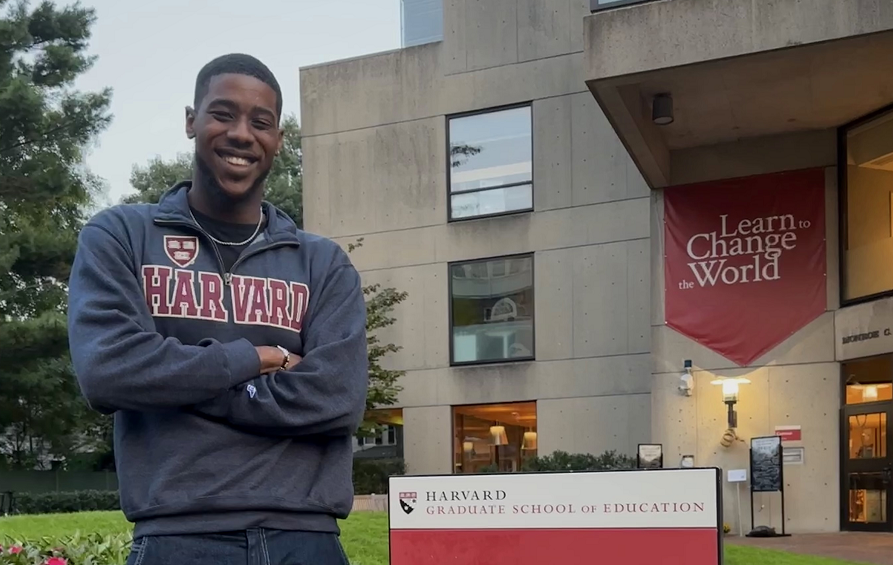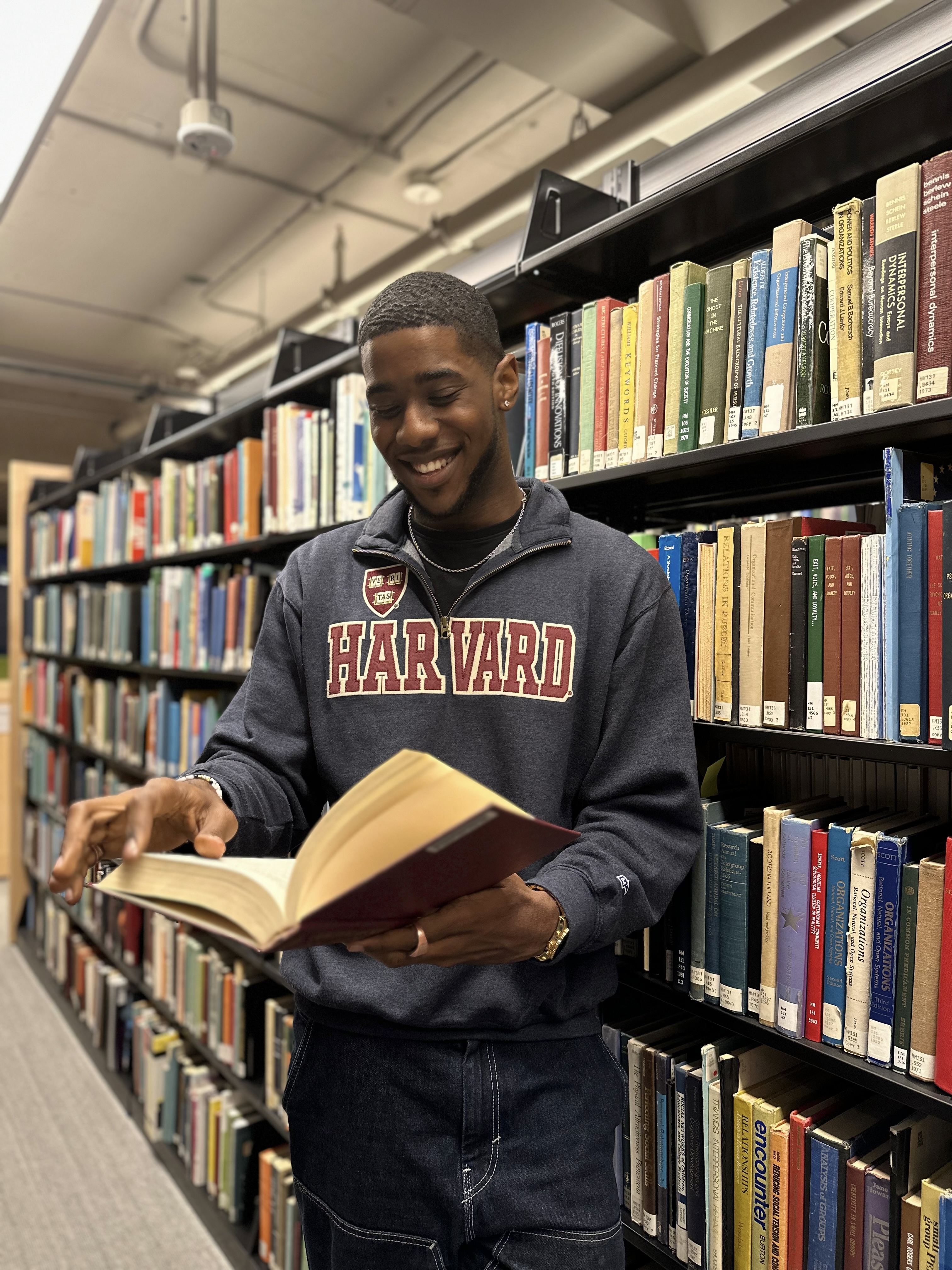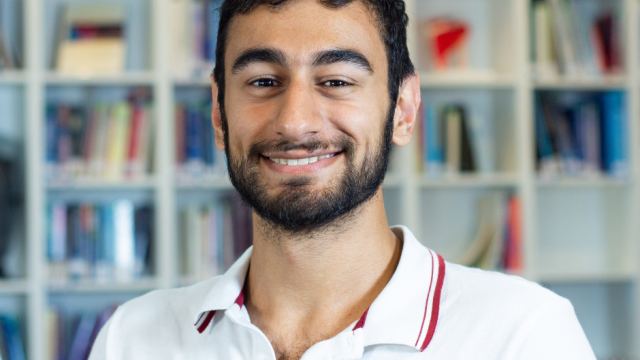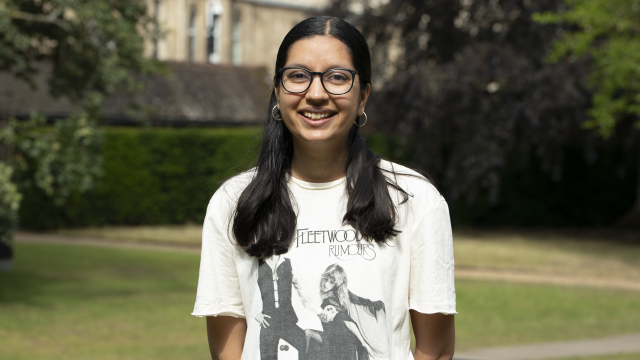Alumnus Jordan Andrew (Psychological and Behavioural Sciences, 2019) grew up in north London, and spent much of his young life caring for his younger brother, who has profound and multiple learning disabilities.
Growing up, Jordan says, ‘I wasn't actually the brightest. I wasn't top of my class. Especially in secondary school, I was in all the bottom sets. I was really struggling because I had all that responsibility at home.’
Jordan graduated from Sidney in 2022, achieving a First Class degree with Distinction and winning five academic prizes. His undergraduate study, The Invisible Dandelions, focused on the experiences of siblings of disabled children, and was the first study of its kind to adopt a photo novella technique, with participants taking photos to illustrate their lives, and as a spur to further discussion.
In January, Jordan was awarded a prestigious Kennedy Scholarship and is now pursuing a Masters at Harvard.
Jordan Andrew, pictured in August 2023 at Harvard University, Cambridge, Massachusetts, USA.
So, can you describe how it was growing up?
‘Yes, my brother - he’s two years younger than me - he had meningitis when he was young, and he suffered extreme brain damage as a result.
‘He needed round the clock care, and there was really no support available at that point. My mum had been a lawyer, but she had to leave her work to be my brother’s full-time, primary caregiver.
‘So, it was me, my mum, and my dad. My dad was still working, so he would go off to work and, at some point, some of the responsibility for looking after my brother would fall on me, as a child - mum wasn't able to do everything.
‘I had a lot of responsibility as a young child, looking after him, carrying out his personal care, attending hospital visits.
‘Sometimes, he would be in hospital for weeks. If I was in school, I wouldn't be focusing on the lessons and the homework, I'd be focusing on getting the bus to see my brother, and that would be regardless of whether I was actually looking after him - I would just go in and sit there.
‘There's a responsibility you have, I guess, as an older sibling to a younger sibling anyway, but I guess in cases like mine that responsibility is just a bit higher.’
And how did that experience affect your outlook?
‘Yes, well, it might sound strange but I think the experience affected me in almost a positive way. I mean, I'm sure a lot of my passions come from that period, and obviously my academic research is driven by my lived experience.
‘I'm a firm believer in your story being your power – turning what was your kryptonite into your superpower. I knew growing up that I didn’t want to let my situation define me.
‘Research shows that the developmental trajectory of somebody in what was my position, a young carer, is pretty dire in terms of career opportunities, educational outcomes and stuff like that.
‘Growing up, my mum would say I was quite a stubborn child. I wouldn't necessarily call what I did stubborn, but I guess I was just trying to persevere, to be resilient, and say, ‘Okay, you know what? I know that I haven't had a very easy childhood, but I want to utilise that experience, to motivate me to succeed, and then to be an example to other children: they need to know that their adversity doesn't have to define them.
‘That was my outlook, as a teenager: I'm going to do something; I don’t know what it is yet, but I'm going to achieve something big.’
The charity Action for Children estimates that there may be as many as 800,000 young carers in the UK, with the vast majority receiving no support.
So, when we look at the impact on young lives of having that caring responsibility, is it just about the time spent? How, in other ways, did being a young carer affect your life?
‘Oh, it's so complex.
‘There's a lot of uncertainty and unpredictability with conditions like my brother’s. He’d have epileptic seizures and that could be quite traumatizing.
‘And there are so many things that can happen within the family as well. Having a disabled person in your family is very hard for everyone, and it can bleed into your relationships with other family members.
‘My dad went through really severe episodes of depression as a result of my brother's condition. And so there were situations where my dad might have had a mental breakdown in public, and I would have to assume that caregiver role to him as well. Now, we’re talking about these things happening when I was as young as eight years old – I was really, really young when Dad went through that, and it was a whole other facet of the experience, as a result of what happened to my brother. So there was a lot going on.’
So, how did you manage to address the impact this was having on your education?
‘Yeah, so I remember a specific conversation with my mother. I said, ‘Mum, I'm not doing well.’ My brother had been in hospital for perhaps three weeks, maybe even a month, because he had a collapsed lung. He was in the I C U, he was on life support. I was in year 10. I was going to school but I would have panic attacks, breakdowns in class. And the school’s response to this was to put me in this windowless room. They put me in isolation for two weeks.
‘So I missed two weeks of school. I was behind already, and I became even more behind. I remember after that, I said to my mum, “Mum, I'm so behind. I need something to help me get back on track.”
‘My mum and my grandmother arranged for me to go to this after-school learning programme. I went every day and I'd also go on weekends, to catch up.
‘I had private tutors as well - a lot of money was spent on me to get me back on track! I needed support because of how behind I was, and that support wasn't something that my school was willing to offer me.
‘I wanted to go to a particular sixth form college because they had a high success rate in terms of students going to Oxford and Cambridge. But the teachers at my secondary school said, ‘There's no way you're going to get in there. That's not going to happen.’ They said my attendance was poor, not knowing that it was poor because of my situation. ‘You're always late. You're not going to do well. You're not a good student. You're going to fail.’ That was my secondary school, basically, in a nutshell.
‘So, I managed to get my foot in the door at the sixth form college. They had this society for students who wanted to go to Oxford or Cambridge, but I got a rejection letter from that, saying they wouldn’t let me join because ‘no-one of your calibre has ever got into Cambridge or Oxford.’ I was like, ‘Wow, okay…’ I was mad. I’d worked hard to get into this space and I wasn’t going to repeat the experience I’d had at secondary school.
‘So I marched myself into the Principal's office and said, "This is why you're going to put me in the programme: I'm a young carer; I've faced a lot of adversity; okay, I didn't get a perfect clean sweep of grades at GCSE, but the grades that I got were good in the context of what I had been through." I’d already had to work 10 times as hard to get the grades I did. He was sceptical. but he let me in.'
So, you eventually made it to Sidney. You mentioned 'The Invisible Dandelions'. Can you tell me about your research, and how you used your own experiences to design that project?
‘Sure. So, The Invisible Dandelions was the first study to use a relatively new research technique called photo novella - basically combining photo-taking with interviews - to explore resilience in the siblings of disabled children.
‘There’s not really any support for young carers and it’s hard for them to identify as such, and define what that terms means, because they don’t meet other young carers, people with similar experiences.
‘There’s also no way really for schools to identify students who are young carers, so, when they are struggling, the schools just attribute it to bad behaviour, rather than trying to understand that there might be extenuating circumstances.
‘An example: one of my participants recalled being 10 or 11, and his disabled sister wouldn't go to sleep. She was awake, she was making a lot of noise, and he had a maths test the next day. As a result, he was so tired the next day that he failed his maths test.
‘The school, they didn't inquire why he failed. It was just, ‘You failed, that's bad, you need to work harder.’ There was no support, no ‘Okay, what can we do to help you?’ If you consider the number of young carers, that’s a massive issue within the school system.
‘So, the “invisible dandelions” play a key role but they are invisible to society. We exist in the shadows and we don't really have a voice, in a lot of cases. So, my study was about uncovering the experiences of young carers and exploring their resilience within that as well.'
So, you’ve talked about the challenge of balancing school work and your responsibilities as a young carer. How was it to move away from home, to university?
‘Oh, Sidney was a very interesting experience. My cohort, we had a lot going on, obviously, with the pandemic. In terms of the three years, there were definitely positives and negatives, ups and downs, but what I will say is that the people that I met at Sidney were people that I want to be friends with for the rest of my life.
‘I think the expectations and the workload at Cambridge can sometimes make it difficult, but Sidney is such a small and beautiful community, everyone's so close. That closeness made the experience so much better. We shared our stresses, we shared our struggles, we shared so much with each other that we created such a great bond. So, overall, I had a really, really amazing experience at Sidney.
‘I had issues, obviously, at home, and that was difficult. I’d get a phone call saying my brother was in hospital and immediately I'd be on the train back home. But one thing I will say is that Sidney was amazing at handling that. Shout out to my DoS and my tutor, Lucy Cheke and Tom Lambert! They were absolutely amazing. I would not have been able to get through those three years without both of them, no way, no way.
‘I had a lot of unfortunate situations occur around exam times. During my second year exams, my brother was in hospital, had COVID - not the best situation at exam time. During my third year exams, he was in hospital again. My parents had COVID and so they couldn't be with him. So, I was in hospital with him day in, day out. And during that time, he had a massive health scare. I was traumatised, I was told I might have mild PTSD, so I had a lot of stuff going on.
‘I was having these three-way calls with Tom and Lucy, and it was ‘Hey Jordan! Okay, what do we need to put in place to make sure everything that needs to happen happens? It was a real ‘We've got you’ kind of thing.
‘On the day of my graduation, Tom was there and he came up to my family and he gave all of us a massive hug. He said to my family, ‘Oh guys, I don’t know how you do it. I was so stressed for him.’ Lucy was the same. Honestly, they were like family to me. They advocated for me, they pushed, they fought for me.’
And now you’re in the U.S. Was that always an ambition?
‘Well, when I was younger, I'd always joke with my parents, ‘I'm going to pack my bags and move to LA!’. I’d always say that to them. (laughs)
‘But, honestly, when I got my results from Cambridge, I was shocked. I did not expect to do as well as I did. My supervisor said that a lot of doors would now be open to me, things I hadn't even thought about.
‘And that's when I stumbled upon the Harvard Graduate School of Education, and specifically the Masters programme I’m now on, Human Development and Education. The programme is looking to create a bridge between research and practice, to create change. And that was basically what I wanted to do. I don't want to just be a researcher. I want to implement programmes, to change things. So I thought, “Wow, this is right up my alley!”'
So, I know you are looking to design interventions for young carers. Can you explain what that means?
‘Yes, so basically, referring back to my study, a lot of the young carers involved said they didn't really know any individuals that were like them. They existed in isolation. And growing up, I kind of felt the same way.
‘They wanted somebody they could share their lived experiences with, who would understand what their experiences as a young carer were, and also that their friends would never really be able to comprehend what they were going through. So one of the things that I've been pushing for is a programme that connects young carers, across London.
‘At Harvard, as part of the syllabus, we need to design an intervention for a group of our choice, so I've created a proposal for a Young Carers Support Group, a six-week summer programme for young carers to connect and share their lived experiences.
‘They would have time to take photos. Then they would come together to discuss the photos they’ve taken, discuss their experiences. It’s about having that opportunity to relate to one another, so they are building meaningful interpersonal relationships. And then the culmination would be like a gallery exhibition where we would invite their parents, their families, their schools, and maybe health professionals like paediatric nurses and psychologists.
‘One of things I found with The Invisible Dandelions - and this is something I did as well growing up - is that a lot of young carers, they repress a lot of their emotions, to protect their families. They do what they're told, and they almost feel a level of guilt for complaining or being upset about what they have to do, because they are looking after somebody they love.
‘So they mask a lot of their feelings, they repress a lot of their feelings, and a plethora of psychological research suggests it’s not good for you to repress your emotions and not communicate them.'
And that point – about the emotions involved – makes me want to ask you about how it is right now, to be in the US, in this amazing place, but away from your brother?
‘Yeah, me and my brother are super, super close. I think having a sibling with a disability creates this unique level of closeness because there's that trust that you build from such a young age.
‘Even when I was very young, I thought, ‘Wow, me and my brother are so close.’ I can't even describe another relationship that equates to the relationship I have with him. So that made the situation of being his carer a bit better, I guess - I knew that I was doing things for my brother because I loved him.
‘It’s very hard for me right now to be away from him. This is the longest I've ever been away from my brother.
‘I'm not worried about him. He has 24/7 care now. But, in terms of our relationship, I know we both feel the other’s absence. So that has been hard, but it means that when Christmas comes around and I can go home, it’ll just be amazing to see him.’
If you have something that would make a good news or feature item, please email news@sid.cam.ac.uk




